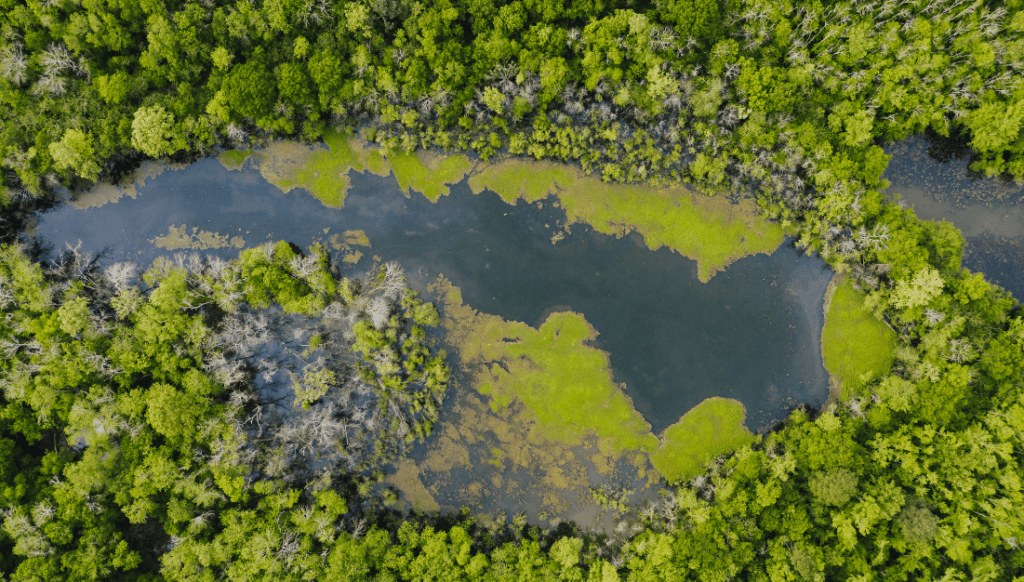

There are more than 3,000 lakes and ponds in Massachusetts. Every year, when it starts getting hot out, they are the perfect place to go for a dip, sail a boat, paddle a kayak, or just lounge on the shore.
But before you dive in, check to see if there is a state or town advisory not to go in the water. With algal blooms like cyanobacteria and red tide occurring every year in some bodies of water across Massachusetts and New England, it pays to be safe.
What is a Harmful Algal Bloom?
When it’s hot and sunny, and the water doesn’t move much, some things like phosphorus and nitrogen can get into the water, harmful algal blooms (HABs) can grow. Think of it like putting too much food in a fish tank; it makes the water dirty and bad for the fish.
The algae that develops can take the form of cyanobacteria, sometimes called blue-green algae, which is microscopic bacteria that can live in any type of body of water. Another HAB that can form is paralytic shellfish poisoning, but often referred to as red tide because it turns the water red.
Think of it like putting too much food in a fish tank; it makes the water dirty and bad for the fis
>> 5 Tips to Keep You Safe on the Road
You can be exposed to HABs through direct skin contact, eating, or inhaling. Across the United States. From 2016-2018 there have been more than 350 human illnesses reported, over 400 animal illnesses and 369 animal fatalities due to exposure to HABs.
Do Lakes and Ponds get Shut Down Because of Cyanobacteria or Red Tide?
HABs like cyanobacteria and red tide can happen at any time, but they most commonly occur in the late summer and early fall. Hot, sunny weather and stagnant bodies of water provide a logical breeding grown for algae, and increased levels of nutrients like phosphorus and nitrogen tend to come after rainfall washes animal waste into the water.
Local, state and federal groups manage and regulate the water quality of bodies of water. Mass.gov keeps a current list of closed public beaches in Massachusetts and officials post a sign at the beach when closed.
The Massachusetts Department of Public Health recommends HAB advisories be issued if:
- Cyanobacteria is visible.
- Tests reveal that the cyanobacteria’s cell count exceeds 70,000 cells per milliliter.
- Concentration of the toxin microcystins exceeds 8 micrograms per liter.
- Concentration of the toxin cylindrospermopsin exceeds 15 micrograms per liter.
Can Cyanobacteria or Red Tide Make You Sick?
What Happens If You’re Exposed to Cyanobacteria?
Ingesting even a small amount of cyanobacteria causes stomach pain. Swallowing a large amount can lead to liver or neurological damage. Just having cyanobacteria touch your skin can cause irritation. Inhaling a spray of cyanobacteria causes symptoms similar to asthma. Pets and children are more susceptible to symptoms.
What Happens If You’re Exposed to Red Tide?
If a person eats seafood that has been victim of paralytic shellfish poisoning, they may be put in life-threatening danger within 2 hours of consumption. Symptoms include respiratory paralysis, numbness, drowsiness, tingling and burning.
Coming into contact with red tide can result in breathing problems. Red Tide can also cause skin irritation, rash or burning or sore eyes. Red tide contact is serious for dogs as well. In some cases, it can cause neurological symptoms.
>> Summer Pet Safety: Tips for Hot Weather
How Do You Remove Cyanobacteria from Water?
There are many removal methods for cyanobacteria, but each has its own pros and cons regarding the type of waterbody the method is being tried in and at what point of the bloom process the algae has grown to. Many techniques potentially cause problems for other life in the water as well.
For example, there are a number of algaecides and other chemical treatments to try to eliminate algae, but they are not recommended during a bloom because they are toxic to other organisms like zoo plankton and fish.
Essentially, it is advised that once a bloom has begun, the best idea is to stay out of the water and let it run its course naturally.
How Do I Keep the Water on My Property Clean?
If you have a pond, creek or any other water body on your property, there are a few quick methods you can use to limit runoff and prevent algal blooms in the water.
- Install rain barrels at your house to decrease the amount of runoff.
- Allow plant growth along the edge of the water instead of a close-cut lawn or concrete.
- Maintain your septic system and pick up your pet’s waste.


How Do You Limit Cyanobacteria?
So many problems seem too big to tackle on our own. So what can you do to help prevent HABs from taking over your favorite nearby pond or lake?
Perhaps the best way to combat cyanobacteria or any other HABs is to prevent it from growing in the first place. Here are a couple easy ways to limit cyanobacteria growth:
- Use the recommended amount of fertilizers. When it rains, this will prevent the fertilizer from becoming dangerous nutrient-rich runoff heading towards your local body of water. Also use phosphorus-free fertilizers if possible.
- Keep your septic system in good standing. Wastewater is full of nutrients. Maintain your septic and prevent wastewater from your system from seeping into nearby bodies of water.
- Pick up your pet’s waste. Waste from wild animals causes enough nutrients and bacteria from entering the water. Picking up after your pet can limit additional issues.
- Keep your yard clippings out of the sewer. Put your yard waste in a compost pile or bag it up and bring it to the dump. Using leaves as mulch or compost helps eliminate runoff.




